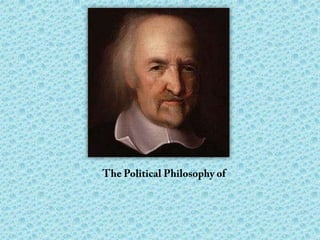
The Political philosophy of Thomas Hobbes
- 1. The Political Philosophy ofThomas Hobbes
- 2. Thomas Hobbes was born in London in 1588. He received his college education at Oxford University in England, where he studied classics. Hobbes traveled to other European countries several times to meet with scientists and to study different forms of government.
- 3. During his time outside of England, Hobbes became interested in why people allowed themselves to be ruled and what would be the best form of government for England. In 1651, Hobbes wrote his most famous work, entitled Leviathan.
- 4. In it, he argued that people were naturally wicked and could not be trusted to govern. Therefore, Hobbes believed that an absolute monarchy - a government that gave all power to a king or queen - was best.
- 5. Hobbes’ Famous Writings The Elements of Law (1640) De Cive (On the Citizen, 1642) Leviathan (1651) De Corpore (On the Body, 1655 ) De Homine (On Man, 1657) Behemoth (1682)
- 6. Hobbes’ Approach to the Study of Politics As a philosopher, Hobbes based his work on macro-anthropological principle. By this, he meant that before we understand the nature of society, we must first adequately comprehend the nature of the human being.
- 7. Nature of the Human Being For Plato and Aristotle Man is a social being Plato emphasized on man’s rationality and Aristotle stressed on man’s political nature For Machiavelli Man is creature ruled by self interest
- 8. Equality among men Hobbes believes that men are equal and this equality is manifested in three ways: Equality in the faculties of mind and body; Equality of hope in achieving goals; Equality in the exercise of man’s natural right to self-preservation.
- 16. Men are power-seekers.
- 20. Such contract is necessary because for Hobbes, man is not sociable by nature.
- 22. Characteristics of the State of Nature “The life of man in a time of war is solitary, poor , nasty, brutish and short.” Leviathan, Thomas Hobbes
- 23. The State of Nature The two cardinal values of war are fraud and force. In this condition men are not governed by rules; there is no central authority; men treat each other as threat to achieve their respective interest; and the only recourse is self-help.
- 24. The State of Nature Since men treat each other as enemies, there is always the tendency to engage each other in war. In the state of nature, men are driven apart and not drawn together. This is why the life of man in the state of nature is solitary.
- 25. The Social Contract Through political association the danger and insecurity that exist in the state of nature will somehow be lessened. A social contract is an agreement or covenant among men that they will transfer their natural right to preserve themselves from sovereign entity. The sovereign power can be one individual, an assembly, or several individuals.
- 26. Characteristics of the Social Contract It has to be voluntary. It must be mutually agreed upon. It involves only the subject. It does not require unanimity
- 27. The outcome of the Social Contract “… instituted when a multitude of men do agree, and covenant, every one with every one, that to whatsoever man or assembly of men shall be given by the major part of the right to present the person of them all or to be their representative… Everyone, those That voted for it and those that voted against it, shall authorize all the actions and judgment, of that man, or assembly of men, in the same manner, as if they were his own, to the end, to live peaceably among themselves, and be protected against other men.”
- 28. The Sovereign Power Hobbes explain that it is not enough that men agree to enter into a covenant or contract for these are only words and can easily be ignored. What is needed is the sovereign– a man or an assembly of men who makes sure that the subjects follow the contract.
- 29. Two ways by which a sovereign can possess power Sovereignty by acquisition Sovereignty by institution
- 30. SELF-PRESERVATION The sovereign must see to it that an environment conducive to the preservation of the subjects lives is established and maintained. Task of the Sovereign power
- 31. The Sovereign Power and Its Rights The Subjects cannot make a new contract or covenant without the permission of the sovereign. The sovereign cannot break the agreement. Those who did not agree must now give their consent since it is agreed upon by the majority. The subjects are the authors of the actions of the sovereign.
- 32. The Sovereign Power and Its Rights The subjects cannot punish the sovereign, or worse, kill him. The sovereign has the right to regulate the doctrine. The sovereign enjoys the power to prescribe the rules governing property– the goods the subject can enjoy and how they may enjoy them. The sovereign has the right to decide on conflicts of law.
- 35. Therefore, subjects owe absolute obedience to the sovereign who to stress the point one more time, is their representative.
- 39. Thus, the behavior of the men in a state of nature is based on decisions made by the individual and by him alone.
